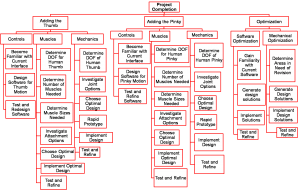Project Management, I got to learn first hand that its both an art and a science. Considering this was one of the few courses where we had to actually complete a project, it gave me a greater understanding how applying theory differs in practice from just learning theory and going home.

- I.) Throughout the course the importance of setting milestones, goals, and even before the goals and milestones, the work breakdown structure (WBS), are extremely important. Breaking down a project into a workable and understandable structure is extremely important. Without having a structure you wouldn’t know where to begin and where to end. At the same time the breakdown can’t be too confusing or you have a risk of potentially undermining your own project. It can’t be vague as well or else the teams won’t know what they’re trying to achieve. Striving for balance was one of the most important things, this was something that I could understand perfectly having worked on a few projects over the course of my professional career.
- II.) The next important task that comes in is then the formation of teams and assigning them with goals and milestones. In our project this was done right after the WBS stage, where we assigned who would do what and when. There was a time frame given and everyone was assigned with a task to accomplish. The importance of the team is fundamental for the success of the project. If we don’t have a team that works well, then it’s all but over. Finding the formula to success is extremely important. The project leader works as a motivator, someone who can get the ball rolling so to speak. The others have to be able to rally behind him or else the project is not going to go anywhere. Jack Welch highlighted the importance of building a team and managing it below.
- III.) One of the things we learnt in class was also that the project managers have to make tough decisions, these decisions have to be made in a moments notice or the project could be over before you know it. This is why project managers act like Mini-CEOs, they are constantly making decisions and they’re constantly monitoring the situation. Through either software such as Microsoft Project which lets you know when goals and milestones have been reached. Once they are reached, the project manager can then focus on whats not done, it’s like being a military commander having set objectives that need to be accomplished in a set order or else you run the risk of failing. This is true for multi-year projects on a massive scale. Like our discussion of the Hoover Dam and Bechtel. You need to make sure you’ve got a team that can handle the workload and are capable of working in various teams. Constant feedback is extremely important.
- There was an excellent link for assessing the effectiveness of a team and I gave it a go after the conclusion of the project that we had. I suggest giving it a go, it was quite handy and informative. http://www.mindtools.com/pages/article/newTMM_84.htm. We scored a 49, in my own assessment.
Overall the key takeaways from the class and our hands on project was to make sure you are constantly monitoring everything, make and prepare for contingencies and make sure you have an “Oh No” plan. Because, as we learnt there is no such thing as a perfect plan, especially once the project is underway, it starts to go all over the place. We learnt the hard way when the venue we had put most of our eggs in vanished before our very eyes.
